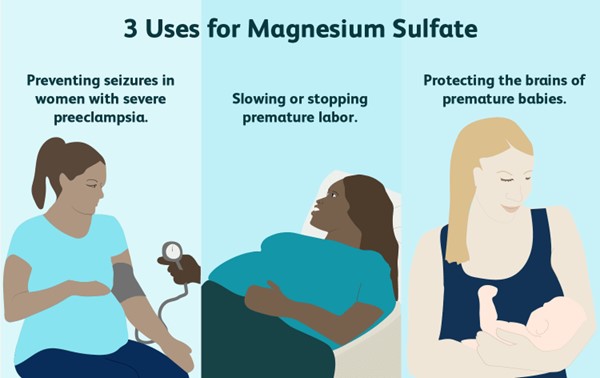Magnesium sulfate is given to women with preeclampsia and eclampsia to:
Improve patellar reflexes and increase respiratory efficiency
Shorten the duration of labor
Prevent and treat convulsions
Prevent a boggy uterus and lessen the lochial flow
The Correct Answer is C
Magnesium sulfate is given to women with preeclampsia and eclampsia to prevent and treat convulsions.

Magnesium sulfate is a mineral that reduces seizure risks in women with preeclampsia. A healthcare provider will give the medication intravenously. Sometimes, it’s also used to prolong pregnancy for up to two days. This allows drugs that speed up your baby’s lung development to be administered.
Choice A is wrong because magnesium sulfate does not improve patellar reflexes or increase respiratory efficiency. In fact, it may cause decreased or absent deep tendon reflexes and respiratory depression as side effects.
Choice B is wrong because magnesium sulfate does not shorten the duration of labor. It may actually prolong labor by inhibiting uterine contractions.
Choice D is wrong because magnesium sulfate does not prevent a boggy uterus or lessen the lochial flow. It has no effect on uterine tone or bleeding after delivery.
Nursing Test Bank
Naxlex Comprehensive Predictor Exams
Related Questions
Correct Answer is ["B","C"]
Explanation
The child’s care should include adequate hydration and pain management. The management of an acute event of a vaso-occlusive crisis is the use of potent analgesics (opioids), rehydration with normal saline or Ringer’s lactate, treatment of malaria (whether symptomatic or not) using artemisinin combination therapy, and the use of oxygen via face mask, especially for acute chest syndrome.
Choice A is wrong because correction of acidosis is not a specific intervention for the vaso- occlusive crisis.
Acidosis may occur as a complication of sickle cell disease, but it is not the primary cause of the crisis.
Choice D is wrong because the administration of heparin is not recommended for the vaso-occlusive crisis.
Heparin is an anticoagulant that may increase the risk of bleeding and does not prevent or treat the sickling process.
Normal ranges for hemoglobin are 11.5 to 15.5 g/dl for children after 2 years of age.
Normal ranges for reticulocyte count are 0.5% to 1.5% for adults and 0.5% to 2.5% for children.
Correct Answer is B
Explanation
The child should receive his regular dose of insulin even if he does not have an appetite. If the child is not eating as usual, he needs calories to prevent hypoglycemia. During periods of minor illness, the child with type 1 diabetes mellitus can be managed safely at home.
Choice A is wrong because giving the child half his regular morning dose of insulin can lead to hyperglycemia and ketoacidosis.
Choice C is wrong because giving the child plenty of unsweetened, clear liquids to prevent dehydration can also cause hypoglycemia.
Choice D is wrong because taking the child directly to the emergency department is not necessary unless the child has signs of severe dehydration, vomiting, abdominal
Whether you are a student looking to ace your exams or a practicing nurse seeking to enhance your expertise , our nursing education contents will empower you with the confidence and competence to make a difference in the lives of patients and become a respected leader in the healthcare field.
Visit Naxlex, invest in your future and unlock endless possibilities with our unparalleled nursing education contents today
Report Wrong Answer on the Current Question
Do you disagree with the answer? If yes, what is your expected answer? Explain.
Kindly be descriptive with the issue you are facing.
